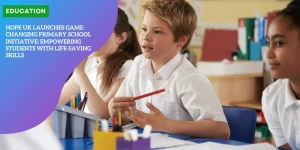90% of Teachers Warn: Post-2020 Speech Development Crisis Hits Primary School Students
The Growing Communication Crisis in Primary Schools
Decline in Speech and Language Skills
Primary school teachers in the UK are raising the alarm about a worrying trend that has escalated since 2020.
A significant 90% of teachers have reported a decline in children’s speech and language skills.
This issue manifests in various ways, from kids struggling to respond to their own names to more severe impairments in basic communication skills.
According to a comprehensive survey, up to 40% of children are now below the expected communication levels for their age.
Observations in the Classroom
Teachers are witnessing firsthand the challenges faced by these young learners.
Imagine a classroom where a teacher calls out a name and the child doesn’t respond—not out of defiance, but because they are struggling to grasp the basic skill of recognising and reacting to their own name being called.
This is just one of the troubling examples that educators have noted.
Survey Revelations
The survey underscores the severity of the situation.
The pandemic has had a lasting impact on children’s language acquisition and development—a crisis that we are only now beginning to understand fully.
The findings align with statements that since 2020, teachers have seen worsening communication abilities among pupils.
Culminating Factors
Several factors contribute to this crisis.
Reduced face-to-face interaction with parents and caregivers has been identified as a primary issue, affecting 58% of respondents. Additionally, 44% of educators pointed to increased screen time and social media usage as major culprits.
These digital distractions are pulling children away from engaging in meaningful conversations.
The pandemic’s unprecedented disruption, too, plays a significant role.
With 34% noting its negative impact, the lack of social interaction during lockdowns has stunted many children’s social and communicative development.
Widening the Understanding
Understanding this communication crisis involves appreciating the multifaceted challenges that contribute to it.
It’s not just about the decline in one skill, but a broader issue impacting children’s readiness for school and their ability to learn, connect, and engage.
Addressing these concerns now is crucial for ensuring that children are not only ready for school but well-equipped for life.
Key Factors Behind the Decline
Limited Parent-Child Conversation
A significant contributing factor identified by 58% of teachers is the reduction in quality time spent in conversation between parents and children.
This crucial interaction forms the backbone of early language development, aiding children in practising speech and understanding the nuances of communication.
With busy modern lifestyles and the convenience of digital distractions, many parents find themselves conversing less with their children than in previous generations.
Increased Screen Time and Social Media Usage
The digital age has undoubtedly revolutionised many facets of life, but its impact on young minds is a growing concern.
According to 44% of educators, increased time spent on screens and social media is a primary factor behind the decline in communication skills.
Children are diverting their attention from face-to-face interactions to digital devices.
The resulting passive consumption of content over active, engaged conversation can lead to a decrease in vocabulary, reduced attention spans, and less opportunity to practise the give-and-take inherent in natural dialogue.
Pandemic’s Impact on Language Development
The pandemic altered day-to-day life globally, creating an environment that has had lasting effects on children’s language development.
A third of teachers (34%) believe that social isolation during lockdowns and the overall disruption to normal routines have contributed substantially to the worsening of speech and language abilities.
According to Children are increasingly starting primary school struggling to talk, teachers have warned, this period saw a significant reduction in socialization opportunities, such as playdates and in-person schooling, that are vital for conversational practice and learning through social interaction.
The outlined factors collectively underscore the urgent need to focus on improving communication practices for young children to ensure their readiness for school.
Recognising and addressing these issues form the foundation upon which new guidelines and support initiatives can be effectively implemented.

New Guidelines for School Readiness
As concerns over declining communication skills in young children continue to grow, a coalition of early years organisations has taken action.
The group, which includes notable entities like Parentkind, the Confederation of Schools Trusts, and the Early Years Alliance, has released a comprehensive checklist for reception-age children.
Essential Skills for School Readiness
The checklist details a range of essential skills that children should ideally develop before starting school.
These skills are designed to ensure that children can participate effectively in the learning environment and include:
| Area | Expectation | Notes |
|---|---|---|
| Self-Care | Use cutlery properly and maintain toilet independence | Essential for school readiness |
| Recognition | Recognize and respond to their own name | Fundamental for classroom participation |
| Emotional Skills | Express feelings verbally | Builds emotional intelligence |
| Physical Activity | Minimum 3 hours daily | Supports healthy growth and development |
| Screen Time | Should be limited and moderated | Excessive use can impact language development |
Backing from Education Authorities
The guidelines have received strong support from Education Secretary Bridget Phillipson.
She emphasised the usefulness of this new resource for parents, helping them navigate the overwhelming information available about child development.
Geoff Barton, chair of the Oracy Commission, stressed the critical role of high-quality conversation and active listening, vital skills in today’s communication-heavy world.
A Call for Nationwide Adoption
Felicity Gillespie of Kindred Squared echoed the importance of these guidelines, urging for their widespread adoption by local authorities, schools, and parents nationwide.
The new list aims to standardise expectations and ensure every child gets the same foundational skills before starting school.
Transitioning from guidelines to implementation is crucial to making a tangible difference in children’s lives.
By equipping children with the necessary skills and reducing screen time, we can significantly enhance their communication abilities and overall readiness for school.
Support and Implementation Initiatives
Government Endorsement and the Role of Parents
The recent guidelines for school readiness have garnered strong support from Education Secretary Bridget Phillipson.
She describes the new resource as a “vital tool for parents,” highlighting its potential to provide clarity amidst the overwhelming amount of information available for early childhood development.
Phillipson advocates that parents leverage these guidelines to ensure their children are well-prepared for the educational journey ahead.
Nationwide Adoption Efforts
Kindred Squared, a leading early years charity, is at the forefront of pushing for the nationwide adoption of these guidelines.
Felicity Gillespie, the charity’s director, stresses the importance of uniform adoption by local authorities, schools, and childcare settings across the UK.
This synchronised effort aims to bridge the gap between what teachers expect and what parents believe their children can achieve, diminishing discrepancies and fostering a stable foundation for all children entering reception.
Emphasising High-Quality Interaction
Educational experts highlight the critical role of high-quality conversations and active listening in supporting children’s language development.
Geoff Barton, chair of the Oracy Commission and former general secretary of the headteachers’ union ASCL, reinforces that “language, in all its forms, matters.”
He argues that, in an age rife with distractions, the importance of meaningful dialogue cannot be overstated.
By equipping children with strong communication skills early on, they are given a voice in their future and the agency to actively participate in their learning journey.
Practical Implementation in Schools and Homes
The checklist provided by the coalition of early years organisations specifies essential skills that children should master before starting school.
These include self-care skills like using cutlery and achieving toilet independence, recognising their names, and expressing their feelings.
Further, the guidelines recommend physical activities for at least three hours a day and call for limited screen time to encourage more real-world interactions and bolster social skills.
By advocating these measures and ensuring their steadfast implementation, stakeholders aim to improve the current state of children’s communication skills, ultimately ensuring they begin school on a strong footing.






